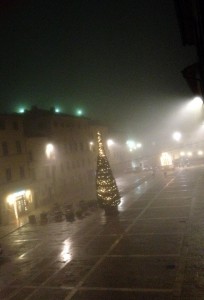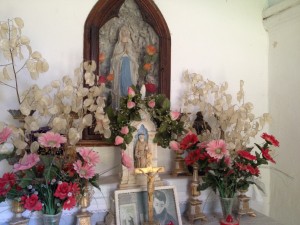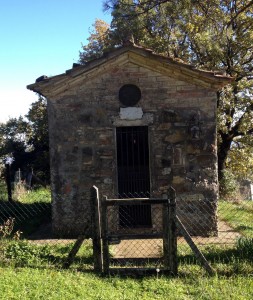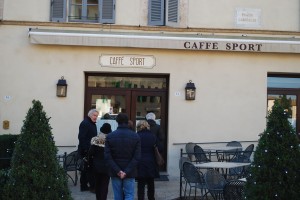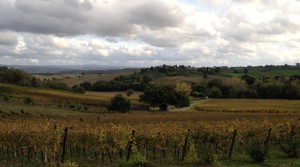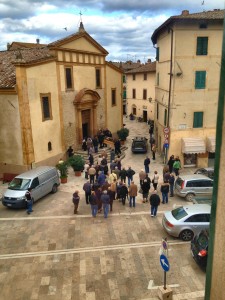
A funeral in Cetona
Today in Cetona there was a funeral, for Ferriero’s mother.
I sat on the window sill of my apartment overlooking the piazza as mourners began to assemble in front of the church a little before 3 p.m. From my window I have a perfect view of the church, the way it juts out at the northern end of the piazza at a sharp angle, framing a side street that goes behind the piazza and up into the highest part of town. On sunny afternoons the church’s ochre façade catches the sunrays and reflects the light back into the piazza in deep yellow hues.
Not today, though. Today is quiet and gray, though it’s not going to rain. I look out at the sky above the church’s terracotta roof and think, thank God. Funerals in the rain are the worst, particularly on foot.
I open the window softly—those solid two-pane wooden windows they use here—and lean out quietly. It clangs a little and someone looks up. I consider that it might look bad, that people in Cetona might think it looks bad. Sta male. I close the window.
—I should go to the funeral, I think to myself.
Something in me hangs back. I am reluctant.
—I don’t know … myself says. I am reminded of a child who will not join others at play.
The church bells start ringing as they do here to announce a funeral. C’e` il morto, people say— there’s a dead one. People trickle into the piazza in couples and groups, making their way up the steps and into the church. I see Loredana. And Maria. Then I see Piero, and the man whose name I don’t know. I see him all the time, but I don’t know who he is. I need to fix that. I think about being more mindful.
The hearse comes into view—some kind of dark blue old model Mercedes station wagon, driving slowly into the piazza, followed, on foot, by Ferriero and his family. The pall bearers take the casket up the steep steps and into the church. Slowly a few people follow. It’s exactly like I remember, except for the new African (and black) priest, on loan for the day from Le Piazze, I am told. I am shocked to see him, here.
I watch for a while. I get my camera and take a few pictures through the closed window. I call Fabiola. She, Lucia, and Cinzia are my closest childhood girlfriends.
—Vai al funerale?— I ask whispering. Are you going to the funeral? The window is ajar. I notice an ex-lover of mine among the mourners. He has lost a lot of hair, I note.
—Ma chi e` morto? Who died?
—La mamma di Ferriero. Ferriero’s mom.
—Ah, la mamma di Ferriero e` morta? Oh, Ferriero’s mom died? They do that in Cetona, they ask you to confirm exactly what you just said.
—Si.
—Ho visto gli annunci, ma … si, Innocenti si chiama? Si, ci sta. I saw the announcements [which they paste to the walls of the town], but … Innocenti was her name? Yes, I guess it fits.
—E allora? So, are you going to go?
—No, non la conoscevo. Non ci ho confidenza, nemmeno con Ferriero. No, I didn’t know her. I don’t have that kind of close relationship, not even with Ferriero.
She is silent. Then she asks, Ma te ci sei amica? Are you friends with him?
I can feel her thinking that I don’t belong. I get a little defensive.
—Nemmeno io la conoscevo. I didn’t know her either. Ci volevo andare per Ferriero, perche` gli voglio bene. Ma non mi decido. I wanted to go for Ferriero, because I love him. But I can’t make up my mind.
We hang up.
—If Fabiola is not going … I definitely do not belong, myself says.
Ferriero. He is the kind of person who, in a town like Cetona, colors the landscape of your everyday life a bit from the background. He worked for the comune, for the town, and for many years he drove the school bus, picking up and delivering children all over Cetona’s broad, hilly countryside. I walked to school mostly, but I often went home with other children in the afternoon, to play or do homework. He saw each of us grow up, and he knew us all by name. After that he filled in for the becchino, the gravedigger, for a while, but mostly he drove Cetona’s garbage truck, a little bright blue truck that fit through the alleyways of the town. Everybody in Cetona knows Ferriero and loves him. He has the sort of kindness, the sort of inner honesty that cleanses you. His whole face lights up in happiness, and a cloud comes over him in sadness.
Every year I have returned to Cetona he has greeted me, hugged me, and asked about my family. I think of him with great affection.
—You should go to the funeral if you want to, myself says.
I fidget. I go to the mirror and consider what I am wearing, just in case. I look out the window. I think back to that time when my friend Rita and I had to leave a funeral because we were laughing so hard. It was embarrassing, but so funny. I smile to myself.
I get out a notebook and write down some thoughts.
—It’s silly of you to go, you don’t even know her, myself says back. Esterina Innocenti. There was a song once by someone, Vecchioni maybe, about Esterina. I try to remember the melody.
—True, but you want to go for Ferriero, myself says.
—Ferriero won’t care if I am there or not, says myself. He barely knows I am here.
Which is not true. One of those lies we tell ourselves, just so. In fact, we talked just the other day. I went running and saw him working in the Del Ticco’s vegetable garden, their orto, which he seeds and plants and tends to because they are too busy with other farm work. He saw me from the road and waved at me. He is unmistakable – tall, a big gangly, with a headful of thick hair, once black, now white, and his broad, friendly face. His brown eyes light up from afar when he sees you.
I stopped to talk with him and he gave me a big hug.
—Ma te non invecchi mai! Se’ sempre piu` bella, he said. You never get older. You are prettier every time. He looked me over.
—Li voi du’ rapi? Do you want two rapi? he asked me. Che ti do? What can I give you?
We stood by his Ape and chatted about his kids and their kids, his pride visible, and then he told me his mother was not doing well, that she was at the old folks’ home, the Casa Famiglia, and that she had gotten worse since his brother died, just a few months back. His brother. His brown eyes went sad. He said they were only two years apart. Their father died when they were little, and their mother raised them by herself. She lived a life of sacrifice, he said. He wiped his face with both of his hands. For a moment I thought he might cry. I thought I might, too. Then he shook it off and we walked through the orto and he filled a box with rapi and tomatoes, and a head of fennel.
I stand up from the window sill. It’s getting late. I resolve to go to the next funeral. If I am here long enough, I figure, there will be another funeral. Then I quickly consider that’ll require someone else dying, perhaps someone very dear.
I look out again. More people assemble at the bottom of the church steps, people who don’t want to go inside, like going to Mass will give them a rash. They wait outside until the procession starts, then they file behind. They stand around with their arms crossed, talking, telling stories.
I notice the crowd.
—It won’t matter to Ferriero if I am there. Look at how many people are going, myself says.
—But it will matter to you. You will be sorry, I reply. Think of how many funerals you have missed in Cetona.
That gives me pause. So many. I think of all the many friends I have lost over the years whose funerals I have missed. Friends, and parents of friends. When my friend Lucia’s father died I sent flowers, I called, I cried, in Charleston, South Carolina. But I was not there. One of my best friend, and I could not be there. I have not been there to mourn with others, with friends with common memories and affections. I have not been there to participate in the communal grieving that Cetona experiences every time someone dies.
I have thought at times, if so and so dies I am going to have to go. How do you draw the line on death?
A few men in suits start coming out of the church, and more people gather. The church bells chime the half hour. Half hour has passed. The funeral is going to start. Now.
—People will wonder why I am there. They will wonder who I am, if they don’t recognize me. I don’t belong anymore, myself says.
—Only you know how you belong. What matters is what is in your heart. Your heart belongs.
—But … I argue.
—You wanted to be back to participate, to be with the people you love. Now you are here. You will regret sitting out.
I remember something we talk about at Jivamukti Yoga. Something Jeffrey Cohen said at some point. Act out of your true self. What matters is the intention.
People start coming out of the church.
I hop off the window sill, grab a black shawl off a chair, and run down the steps of my house and into the alley and down into the piazza. I bump into Carlo Tosoni. We grew up together. We have known each other for more than forty years. He is wearing beautiful yellow ochre pants and a tweed jacket. As kids he lived up a steep hill from my house, he could almost spit onto the roof of my house, and he used to organize little groups of boys to gather in the dark to scare me on my way home at night, on weekends, when I was allowed to go out.
He puts his arm around my shoulders.
— Che fai? he asks. What are you up to?
—Vado al funerale. I am going to the funeral.
—Anche io. Si cammina insieme. I am too. We can walk together.
I am relieved. I breathe.
Carlo is a jokester, known for his cynical, dry wit and hilarious commentary. It has not abated. I ask about his wife and his son, then Carlo looks out onto the crowd of mostly elderly people and says that when he is 101 he wants to have a party, for those 95 and up.
— Con le badanti saremo. We will have caretakers, he says. We laugh. He elbows me in the side. He has always done that, a gesture of conspiracy.
A few people look up. People like to appear serious at funerals, even though during the procession they talk about everything from the olive harvest to their health to the color of the socks of the person walking in front of them. I laugh.
The pall bearers come out of the church carrying the casket, and Ferriero comes out with his wife, Anna, and his family. The procession assembles and the priest leads the way, the hearse following, and then the mourners, on foot. The priest reads prayers over a microphone, a new development since I have been gone. The way to the cemetery leads out of the piazza and up the hill toward Sarteano, then it veers off towards the outskirts of town and becomes a country road, curvy and narrow and lined by cypress trees. It is a lovely road, about a mile long. People walk slowly behind the hearse, arm in arm, in twos or threes, the decorum falling away as the procession moves, particularly in the rows farther away from the priest. It’s a bit like high school, I think to myself. Now people are talking, joking about this or that, telling stories. Carlo, ever curious, is focused, I see, eavesdropping on a man behind us who is telling a story.
At the mouth of the road to the cemetery tears fill my eyes. I am surprised, taken aback. I don’t want Carlo to see me cry. He is going to turn to me and grab me and say something like,
—Madonna, ma che fai, piangi? Ma perche` piangi? Ma non piange’, via, che dopo mi fa’ piange anche a me. Virgin Mary, what are you doing, are you crying? Why are you crying? C’mon, don’t cry. You’ll make me cry, too.
And then I am going to laugh, Carlo always makes me laugh.
But what I really would like to do today is cry. What I want to do today is mourn, here, in Cetona. I want to stop the procession, and the hearse, and I want to stop this moment, and I want to lie down and cry for the family of faces that fills my head, all the people I lost, too, even though I was far away: Edoardo, lover and friend, dead at fifty. Andrea Narduzzi, dear friend, so missed, dead at forty-eight. Stefano, with whom I shared birthdays. Maurizio, who killed himself. I want to mourn here, today, for Elio, Giannina, Greta, all like parents to me, since I was a child. For Aldo and his wife, Beppa. Pio. Giuliano Landi and Bruno Terrosi. And for the parents of friends of mine — Lucia’s father, Franco Patrizi, Stefano and Mauro’s father, Alfredo Del Ticco, Dario’s father, Ilario Bennati, Andrea’s father, the Maresciallo, Fabiola’s father. And many others.
I know at this very moment that I am exactly where I belong, at this funeral, to honor not only Ferriero and his grief, but all those in Cetona whose lives and burials I missed during all these years away. Those whose company I have missed, and whose deaths I have mourned alone, from afar. And for my own sadness, my own grief.
—Certo e` morta tanta gente. Che peccato, Carlo says, shaking his head. So many people have died. What a pity. He put his arm around my shoulder and pulled me to him.
I am glad I got off the window sill.
Sybil Fix©2013
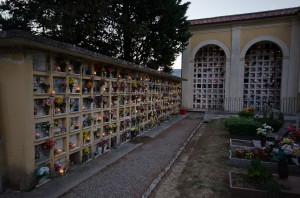
Cetona’s cemetery

